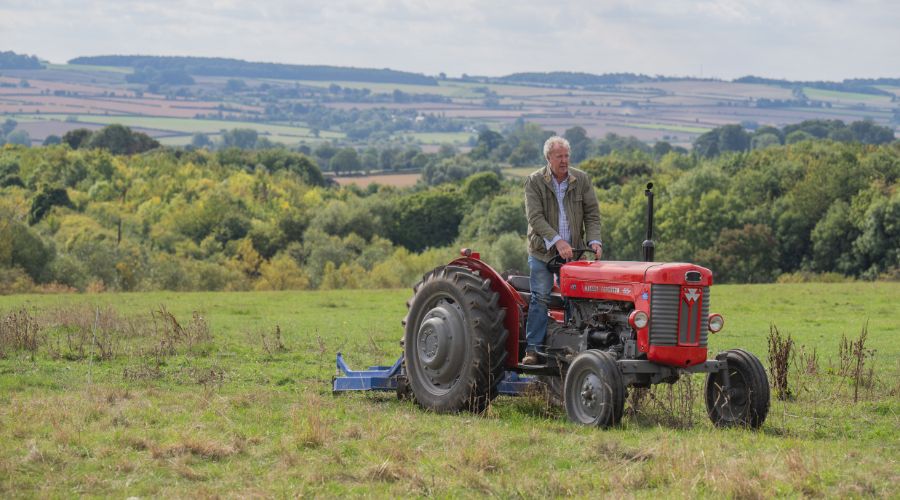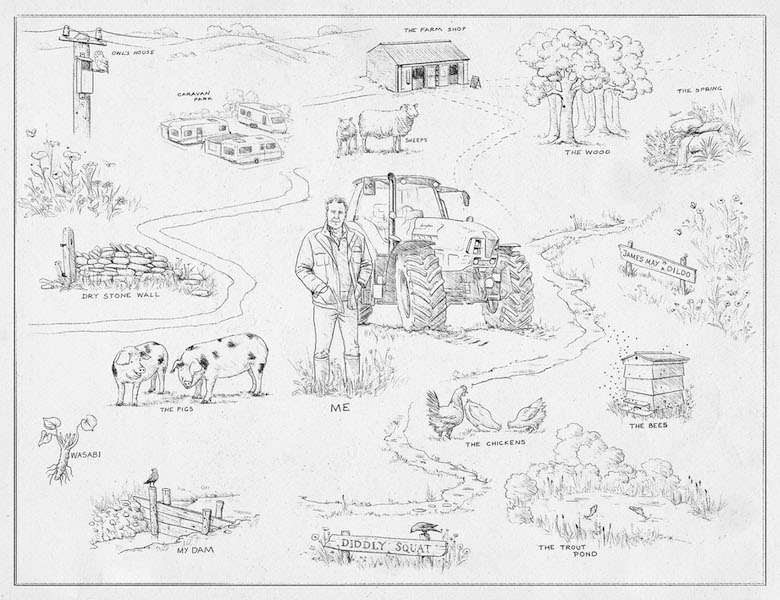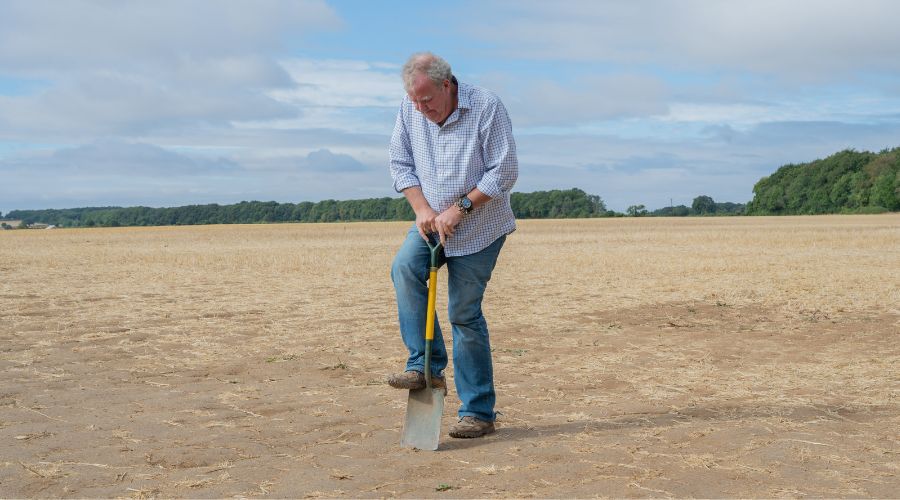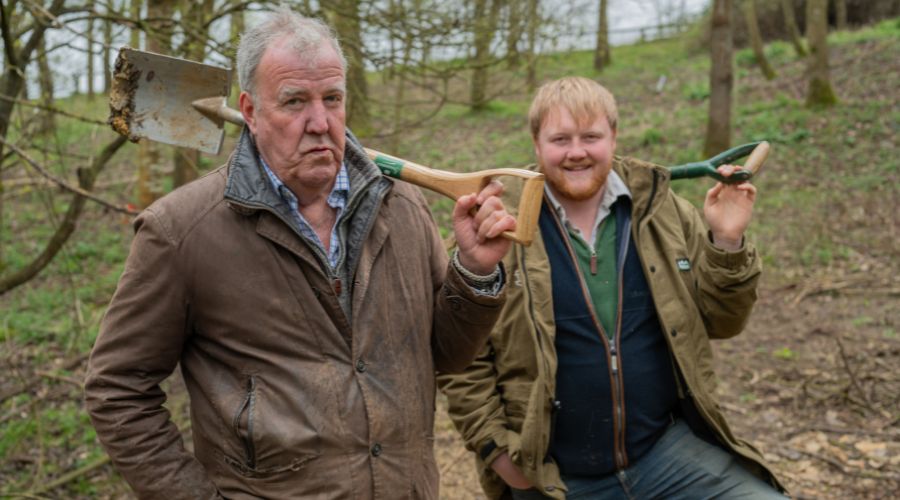Jeremy Clarkson: ‘I arrived at a crossroads. And was not sure which way to turn’
24th October 2024
Clarkson’s latest book is a witty and at times hard-hitting defence of British farming, that cements his transition from trainee to fully-fledged farmer.

“Yes it’s all a complete disaster” – is the opening line of Jeremy Clarkson’s latest book, and it sets the tone for a humorous, yet deeply honest insight into farming over the past year.
The fourth book in the Diddly Squat series, Home to Roost, follows another year in Clarkson’s farming journey, and with each passing year, his advocacy for the industry only grows stronger.
Once best known for his antics on Top Gear, Clarkson has become someone who ‘lies awake at night worrying about soil’.
The book explores many of the major challenges impacting British farmers – from extreme weather conditions, to loss of local abattoirs, red tape, food security and pressures from environmentalists.
But despite its bantering tone, it touches on the serious issues facing food and farming, with Clarkson even opening up about his thoughts of selling the farm.
Ground harder than diamond-infused granite
The challenges Diddly Squat has faced over the past year include ground that was ‘harder than diamond-infused granite’ after the hot dry summer of 2022.
When it was finally drilled with oilseed rape, the whole crop was eaten by cabbage stem flea beetle, writing off the £3,000 spent on seeds.
Oats were planted instead but this too turned ‘hearing aid beige’ and died, while the spring barley used for Hawkstone beer – AKA Clarkson’s ‘thinking juice’ – had to be sold as animal feed following a cold spring and hot June.
Meanwhile, the lion’s mane mushrooms which featured in the latest season of Clarkson’s Farm, were hit by a ‘weird mould’.
Taking a jocular jab at the consumer, Clarkson says that his oats only sell for £200/t ‘because you’d rather have Cheerio’s for breakfast’ and ‘if I try to sell you one of my goats for anything like what it cost to raise, you’ll say “how much?” And go to McDonalds instead.’
READ MORE: Jeremy Clarkson launches new beer as tribute to British farmers
READ MORE: What will be served in pub bought by Jeremy Clarkson?
A novel approach to climate change
Never one to be deterred by challenging conditions, he decided to adapt to climate change by growing durum wheat ‘rather than moaning about global warming’.
This year, however, there was no global warming, he writes, so his wheat also wound up as animal feed.
The self-declared trainee farmer quips that perhaps the most sensible approach to climate change is to grow oranges and lemons rather than barley, wheat and OSR, and to swap cows for camels.
Clarkson is well known for his multitude of hare-brained entrepreneurial schemes, but in the latest book he acknowledges: ‘I’ve overdone it’ – but promptly decides to start manufacturing walking sticks from felled trees on his land.

Red Tractor gripes
Clarkson also educates readers on the meaning of the Red Tractor logo on food products – it indicates, in Clarkson’s words, that the farmers who reared and grew the ingredients ‘have spent a whole day in the recent past rolling their eyes and being annoyed’.
In return for spending a day with a Red Tractor inspector, who Clarkson reckons is always called Colin, and giving him £800, farmers can display the Red Tractor logo on their produce, ‘which you, the consumer, ignore, because you’d rather buy the alternative from Morocco. Because it costs 2p less’.
Whilst he believes the scheme itself is worthwhile, his views on its beleaguered, and now cancelled, Greener Farms Commitment, are far from positive.
‘It’s perfectly fine, really, for Red Tractor to make sure I’m not selling spring onions that have been fertilised with cocaine,’ he writes.
‘But it’s not fine to insist that before I get my accreditation, I’ll need to prove that underneath the overalls and the beanie, I’m Greta bloody Thunberg.’
On a serious note
On top of the numerous trials and tribulations at Diddly Squat, 2023 saw the cost of seeds, sprays and fertilisers soar from £40,000 to £110,000 on the farm, as a result of the Russian invasion of Ukraine.
‘Having done that, all I could do was hope the weather would be good. Which it wasn’t,’ he adds.
But on a serious note, Clarkson acknowledges that for the likes of him and Adam Henson, there’s a TV career to fall back on, but for thousands of other farmers: ‘It’s not alright: 2023 has been a disaster’.
He also shines a light on the closures of local abattoirs, including his own, which now necessitates a 1.5-hour drive every week.
Suggestions to open up mobile abattoirs have been scuppered by rules and regulations that mean ‘it would be easier to open an open-air anthrax factory in the middle of Godalming’.
But unless a solution can be found Clarkson fears the British countryside will ‘no longer echo to the mournful lowing of cows or the idiotic noises sheep make’.
And, as he points out, this will have absolutely no effect on global weather – it will only mean importing meat, which will ‘taste, just faintly, of chlorine’.

Thoughts of selling up
Whilst the book is largely comprised of witty humour at the difficulties of farming, Clarkson is clearly not immune to the emotional toll.
He writes: ‘So I’ve tried farming conventionally and it didn’t work.
‘I’ve tried diversifying and that didn’t really work either. And I’ve tried with sheep and pigs and cows and that has been a bit of a disaster as well.
‘So I arrived at a crossroads. And was not sure which way to turn.’
He shared that he had contemplated selling the farm and ‘earning far more than I do from growing bread and beer and vegetable oil’.
But he admits: ‘I like having it and for very good reasons’ and it would be ‘heart-breaking’ to do nothing.
READ MORE: Jeremy Clarkson: Send youngsters to farms rather than national service
READ MORE: Meet company helping Jeremy Clarkson introduce regen ag practices
Farmers are getting unricher by the day
When Clarkson first announced his plans to become a farmer, some may have had doubts about how seriously he would take it.
But the former motoring journalist has proved to be a vocal and active defender of the industry.
His latest book is no exception and he asks readers to consider the cost of producing a tin of baked beans, and how much of the price paid by consumers goes back to the farmer.
‘Yes you’re absolutely right. It’s b****r all.’
Furthermore, he writes: ‘Everyone has it in their heads that farmers are made of money and can simply go on paying.
‘Now I’m not going to plead poverty here because that would be daft, but the vast majority of farmers, especially tenant farmers, are not rich.
‘And they’re getting unricher by the day. The grants and the subsidies get smaller. The prices go down. And the government demands get more preposterous.’
Soil or sky?
Clarkson also aptly explains the dilemmas faced by farmers in improving their environmental impact, as he explores the choice between ploughing or spraying, using slug pellets, or not.
‘Do you want lager or worms? Do you want healthy soil or a healthy sky? Do you want bees or orangutans?
‘These are the questions I’m facing every single day. It’s a multiple-choice world of no right answers.’
ELMs also comes in for ire, with some farmers taking 60% of their land out of food production – whilst 20% of Diddly is in environmental schemes.
Clarkson admits that trying to understand the schemes ‘is like reading the old cosine book I had at school or trying to work out what a slide rule is for’.

He adds: ‘Of course you might think, as you sit there eating your shoes in a desperate bid to stave off starvation, that it might have been better if we’d stuck with the old system where farmers were paid to produce below cost food rather than this new system where they get taxpayer cash for growing nitrogen.’
Christmas at Diddly Squat
In spite of the justifiable grumbling and concerns, Clarkson has a love of farming that appears to have taken even him by surprise.
Writing during his fourth Christmas as a farmer, and his first where every part of his Christmas dinner was grown at reared at the farm he says:

‘I witnessed the birth of the cow that provided the joint I shall have for lunch tomorrow.
‘I can see the field from my kitchen window where the potatoes grew. The flour and the gravy. The beer. The horseradish. It’s all from here. Even the Christmas tree.
‘I find that weirdly satisfying and I’m not sure why.
‘When you’ve grown your own food it’s a different matter […].
‘If you planted the seed and you watered the plant as it grew, the satisfaction you get when you eat it is as enormous as it is unexplainable.’
Diddly Squat: Home to Roost, by Jeremy Clarkson, is available from 24th October (RRP £22.00), published by Penguin Michael Joseph.
Read more rural news.
